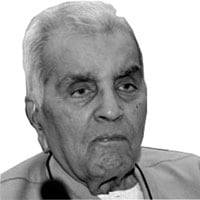Opinion One-third quota,double vision
There seems to be an impasse on the womens bill. It can easily be tackled
It is ironic that Sharad Yadav,who constantly reminds us of his Lohia legacy,should be opposing the Womens Reservation Bill on the ground that a sub-quota should be provided for OBCs. He has probably forgotten that Dr Lohia believed that in order to endure equality and dignity in society,Dalits and women should be placed in higher positions even if they are not most capable,to compensate for past injustices. Dr Lohia did not bifurcate the quota for women for him the suffering women must not be split by sub-castes which will only weaken their capacity to demand gender justice.
Though women constitute about 50 per cent of the population,their strength in the Lok Sabha has been almost negligible right from 1952 when they numbered 45,to about 60 at present.
An International Labour Organisation study shows that while women represent 50 per cent of the world adult population and a third of the official labour force,they perform nearly two-thirds of all working hours,receive a tenth of world income and own less than one per cent of world property. Therefore,reservation for women is not a bounty but only an honest recognition of their contribution to social development.
Women activists must appreciate that opposition to the bill arises not so much from any ideological stand as the real apprehension of the existing male members when they are asked to commit political hara-kiri by being asked to vacate their seats for women members. To expect this is totally unrealistic; the legislators are not like Karan of the Mahabharata who was even willing to surrender his life saving belt,or Jesus of Nazareth who willingly embraced the cross to
redeem his fellow beings.
I have always maintained that all this can be avoided by increasing the membership of legislatures so that one-third representation can be given to women without disturbing the existing male members. Even Lalu Prasad in his recent Parliament speech referred to the increase of seats I have no doubt that if this increase is done Lalu,Sharad and others can be persuaded to give up their insistence on sub-quotas. There is an old adage that both women activists and sub-quota protagonists should remember: a little bending is necessary to shoot the arrow straight.
At present there is a comfortable government majority. If it is to surrender one-third of its membership along with the others,what is the guarantee of retaining its majority? Is it wise or politically sensible or in the interest of the country to play with the stability of the government in these delicate times?
At present,a parliamentary constituency on average has a population between 1.5.million to 2.5 million,and a state assembly constituency two to three lakh in most states. If there is a 50 per cent increase in membership of Parliament and state legislatures and provision made for double-member seats in the top half of constituencies,elections to elect one woman in each of these extra seats can take place immediately,so that womens representation can be provided in all the legislatures,including the 15th Lok Sabha. The law of double-member constituencies prevailed up to 1957. Similar provisions for double-member constituencies for women would only be following a precedent.
We know that this attempt failed because the constituents of some parties insisted upon a sub-quota in the womens quota,even though this is not permissible under the Constitution. The argument of sub-quotas amongst women is a red herring invoked by male members who are in fact against women occupying positions of power. Fortunately,this anti-woman block of legislators has been rejected by the electorate.
The Parliamentary Standing Committee under Dr Nalchinpan had almost finalised its recommendation for double-member constituencies which would ensure a one-third womens quota,and even more if a woman gets the highest vote.
Another unfounded fear expressed is that womens reservation would mean change of reserved constituencies every election cycle. This is a misapprehension. Realist supporters of womens reservation do not envisage any such thing happening without a correspondent increase of Parliament strength to 750 (proportionately in the state legislatures). This shifting of seats is not uncommon it is done frequently in the case of Scheduled Caste seats. And it can be provided that change of double constituencies will only be after two general elections.
There is a more urgent and stronger reason for double-member constituencies. We have just had parliamentary elections and also some time back assembly elections. If the insistence is not to increase the seats by double-member constituencies,it is seriously suggested that one-third of present members of Parliament and state assemblies be so considerate as to resign their seats to accommodate a fresh election for women legislators. If this course is impossible then opposition to double-member seats will mean that women will have to wait at least five years to get reservation. A wait for such a long period will pulverise the whole struggle of women activists for all these years.
If there is agreement on the double-member seat formula,the identification of seats can be done immediately. All that needs be done is to identify the most populated constituencies and have them declared as such (this will also mean no haggling and a rule-of-thumb quick measure). Women could be elected from each of these constituencies. I feel women activists should seriously opt for double-member constituencies if they want representation or face another decade of useless bravado,false promises and mutual mud-slinging. Frankly,I see no logic as to why womens organisations should object to such a course the more they delay,the more the danger of the Sharad Yadav kind of perverse logic spreading.
The writer,a retired chief justice of the Delhi high court,was
chairperson of the Prime Ministers High Level Committee on
Status of Muslims express@expressindia.com


